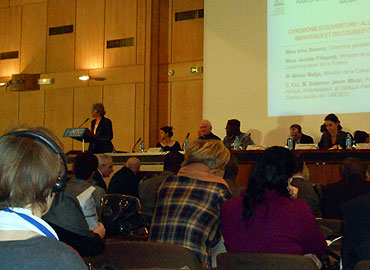|
Paris, 18/02/2013
The MBI Al Jaber Foundation supports an international meeting of experts to discuss the safeguarding of Mali’s cultural heritage.
The MBI Al Jaber Foundation has played a pivotal role in convening a recent UNESCO conference to discuss the protection of Mali’s cultural heritage and to enable the fine-tuning of a definitive plan, which will safeguard the region’s ancient tombs, artefacts and manuscripts.
The meeting was opened by Ms Irina Bokova, UNESCO Director General; Ms Aurelie Filippetti, Minister of Culture and Communication of France; Mr Bruno Maiga, Minister of Culture of Mali and HE Mr Solomon Jason Mbuzi, Chairman of UNESCO Africa Group, and Ambassador and Permanent Delegate of Zambia to UNESCO. The delegates expressed their sincere gratitude to the MBI Al Jaber Foundation and to its founder and sole patron, Sheikh Mohamed Bin Issa Al Jaber, for his support of this conference.
HE Sheikh Mohamed Bin Issa Al Jaber, UNESCO Special Envoy, explained that he was “truly saddened by the loss of life in Mali and the destruction of the protected sites in Timbuktu and Gao” but was “very happy to support this important meeting”. He went on to say that he was “looking forward to the moment the UNESCO plan would lead to effective action on the ground in Mali”. He expressed the need for others to support UNESCO’s mission and explained that his Foundation would be sponsoring another conference at the School of Oriental and African Studies, in London, also focused on the protection of Mali’s cultural heritage.
The meeting began with a status report on Mali’s cultural heritage and went on to consider the possible responses to the current crisis. During the final session, the UNESCO plan of action and associated budget was discussed in detail to ensure that the efforts of the international community, and other partners, would be coordinated effectively and efficiently. The conference was followed by a concert including artists from Mali and the wider region.
Since May of 2012, the UNESCO World Heritage Sites of Timbuktu and Gao have been repeatedly attacked by Islamic militants and, as a result, have suffered considerable damage. Eleven of the sixteen tombs in Timbuktu have been destroyed and it is estimated that some 2000 to 3000 ancient manuscripts have been burned. The current fear is that artefacts and manuscripts will be illicitly trafficked - smuggled from Mali and eventually sold on the black market to interested parties.
Further Notes
On the 28th of June 2012, Timbuktu and the Tomb of Askia (top image) were placed on the “List of World Heritage Sites in Danger” with the aim of mobilising the international community to help Mali in its efforts to safeguard these sites. UNESCO is working with the International Criminal Court to assist with an investigation into war crimes, the definition of which includes “intentionally directing attacks against buildings dedicated to religion, education, art, science or charitable purposes”.
For further information, please contact:
Director Public Relations
[email protected] |


